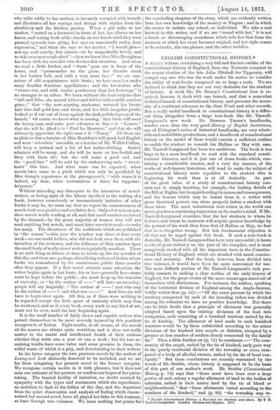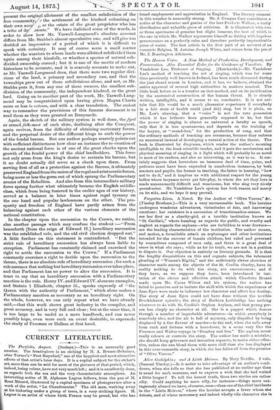ENGLISH CONSTITUTIONAL HISTORY.*
A BULKY volume, containing a very full and distinct outline of the constitutional history of England, from the Teutonic conquest to the recent election of the late John Mitchell for Tipperary, will compel any one who has the work under his notice to consider the utility of text-books composed on so large a scale. Woare inclined to think that they are not very desirable for the student of history. A work like Dr. Broom's Constitutional Law is re- quired, because it deals with one branch, and that a somewhat technical branch of constitutional history, and prevents the neces- sity of a continual reference to the State Trials and other records. But a really useful handbook to constitutional history is a differ- ent thing altogether from a large text-book like Mr. Taswell- Langmead's new work. Dr. Dawson Turner's handbooks, smaller even than the very good History of English Institutions, one of Rivington's series of historical handbooks, are very admir- able and useful little productions, and a handbook of constitutional history on the model of these would contain a sufficient outline to enable the student to consult his Hallam or May with ease. Mr. Taswell-Langmead has been too ambitious. The book is too large to be a mere handbook to read with the standard consti- tutional histories, and it is just one of those books which, con- taining a considerable essence, and a very dry essence, of the works of well-known historians, will tend to make the subject of constitutional history more repulsive to the student who is beginninghis work than is at all desirable. As part of the great value of a study of constitutional history con- sists not in simply knowing, for example, the leading details of the Bill of Rights, but in apprehending its causes and consequences, and the lessons which may be learnt from it, a writer with great historical powers can alone properly imbue a student with these ideas. The most industrious text-writer in the world can never produce a continuing impression on the reader's mind. If Mr. Taswell-Langmead considers that the law students to whom he lectures and whom he instructs will acquire greater knowledge by the perusal of his work than from that of Hallam or May, we fear- that he is altogether wrong. But this fundamental objection is all that can be urged against this book. If such a text-book is desirable, Mr. Taswell-Langmeadhas been very successful ; it bears- marks of great industry on the part of the compiler, and is most completely stocked with all the important facts in the Constitu- tional History of England, which are detailed with much concise- ness and accuracy. Had the book, however, been divided into two volumes, it would have been far more convenient for use. The most difficult portion of Mr. Taswell-Langmead's task pro- bably consists in making a clear outline of the early history of England, for the great events of the more recent ages stand out of themselves with distinctness. For instance, the author, speaking of the territorial division of England among the Anglo-Saxons, boldly writes thus (p. 12) :—" Of the exact process by which the territory conquered by each of the invading tribes was divided among the colonists we have no positive knowledge. But there- can be little doubt that a principle of allotment was generally adopted based upon the existing divisions of the host into companies, each consisting of a hundred warriors united by the tie of kinship. The allotment of land made to each hundred warriors would be by them subdivided according to. the minor divisions of the kindred into »myths or districts, occupied by a greater or less number of settlers closely connected by the family tie." Then a little further on (p. 14) he continues :—" The com- munity of the nzcegth, united by the tie of kindred, early gave way to the purely territorial division of the township or vices, com- posed of a body of allodial owners, united by the tie of local con- tiguity." But these conclusions are scarcely warranted by the words of Mr. Stubbs, whose history is supposed to be the basis of this part of our author's work. Mr. Stubbs (Constitutional History, p. 74) says that "there must have been over a large portion of each colony a regular allotment of land to the bodies of colonists, united in their native land by the tie of blood or neighbourhood," that "these allotments varied according to the numbers of the kindred," and (p. 82) "the township may re- , English Constitutional History: a Text-book for Students and others. By I P., Taswell-Langmead. London Stevens and Haynes. 1873. free community, their own acc a tribe of d
order to snow how Mr. Taswell-Langmead's absolute account differs from Mr. Stubbs's almost speculative one, and will give too decided an impression of a period of which it is difficult to speak with certainty, it may of course seem a small matter whether the warriors to whom lands were allotted subdivided them again among their kinsfolk, or whether a species of natural sub- divided ownership ensued ; but it is one of the merits of modern historians to be accurate, and it is scarcely accurate to make out, as Mr. Taswell-Langmead does, that there were two regular divi- sions of the land, a primary and secondary one, and that the townships grew out of these subdivisions alone, and not, as Mr. Stubbs puts it, from any one of these owners, the smallest sub- division of the community, the independent kindred, or the great lord. Going on to another part of the work, Mr. Taswell-Lang- mead may be congratulated upon having given Magna Charta more or less in extenso, and with a clear translation. The easiest way to remember the provisions of this famous document is to read them as they were granted on Runymede.
Again, the sketch of the military system is well done, the fyrd or armed folk-moot of each shire, declining after the Conquest, again revives, from the difficulty of obtaining mercenary forces, and the perpetual. desire of the different kings to curb the power
of the feudal barons. But our author perhaps scarcely points out with sufficient distinctness how clear an instance the re-creation of
-the ancient national force is of one of the great checks upon the
growth of the feudal power of the chief landholders. This force ;not only arose from the king's desire to restrain his barons, but it no doubt actually did serve as a check upon them. From serving first of all as a protection against the Barons, it ultimately preserved England from the union of the regal and aristocratic forces, being more or less the germ out of which sprang the Parliamentary armies of the Rebellion. And also from this intermediate military force sprang further what ultimately became the English middle- Class, which from being fostered in the earlier ages of our history, served as a balance in later times against regal tyranny on the one hand and popular lawlessness on the other. The pro- sperity and freedom of England have partly arisen from the balancing against each other of the various elements of the national constitution.
In the chapter upon the succession to the Crown, we notice, also another passage which may confuse the student :—"From henceforth [from the reign of Edward II.] hereditary succession was the established rule, and the old civil election dropped out." A little further on this statement is contradicted. "But the strict rule of hereditary succession has always been liable to exception. Parliament has constantly claimed and exercised the right to settle the succession to the Crown." If a Parliament constantly exercises a right to decide upon the succession to the throne, there is no absolute rule of hereditary succession ; for such a rule assumes that nothing but hereditarysuccession ever takes place, and that Parliament has no power to alter the succession. It is truer to say that an hereditary succession with a Parliamentary sanction is the rule. Henry IV. and Edward IV. alone are examples, and Statute 1 Elizabeth, chapter iii., speaks expressly of "the Queen with the authority of Parliament," which alone makes a Parliamentary sanction as necessary as an hereditary right. On the whole, however, we can only repeat what we have already said,—that this work shows great industry in the compiler, and great accuracy, and is very full and clear; but at the same time, it is too large to be useful as a mere handbook, and can never possibly hope, even were such an event desirable, to supersede the study of Freeman or Hallam at first hand.
present the origin 1 allotment of the smallest subdivision of the r the settlement of the kindred colonising on or the estate of the great proprietor who has Jtients." We have italicised some of the words, in































 Previous page
Previous page